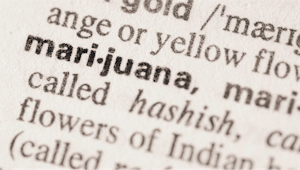
Keenan Constance / Unsplash
Is THCV the Next Big Cannabinoid for Focus and Energy?
THCV may boost focus, energy, and appetite control without the typical THC high.
THCV, short for tetrahydrocannabivarin, is a rare cannabinoid found in certain cannabis plants, especially a few Cannabis sativa landrace strains. Some people call strains high in THCV “diet weed” because of its connection to appetite suppression and weight loss, but its appeal goes far beyond that nickname.
Consumers and researchers are interested in THCV for its potential to enhance focus, boost energy, and support overall wellness. Cannabinoid research on THCV is still in its early stages. Yet, findings from mouse models, a few human studies, and firsthand reports suggest this minor cannabinoid may also play a role in metabolic health, neurological protection, and other physiological effects.
Key Takeaways

Herb
- THCV is a minor cannabinoid found in select cannabis strains.
- THCV is known for potential appetite suppression, energy, and focus.
- At low doses, THCV may block CB1 receptors and reduce THC’s high; at higher doses, it mildly activates CB1.
- Research suggests benefits for metabolism, insulin sensitivity, inflammation, and neurological protection.
- Early studies show THCV can boost energy and daily activity without increasing appetite.
- High-THCV strains include Pink Boost Goddess, Doug’s Varin, Durban Poison, and Malawi Gold.
What Is THCV?

Vandal
Tetrahydrocannabivarin (THCV) is a minor cannabinoid made from cannabigerovarin acid (CBGVA), one of the two main chemical building blocks in the cannabis plant. CBGVA is converted into THCVA through the action of THCA synthase, and when THCVA is heated or exposed to light, it becomes THCV, a process called decarboxylation.
Naturally present in only small amounts, THCV appears most often in certain cannabis strains, but breeders are now developing cannabis plants with higher levels to meet demand for THCV products like THCV gummies, THCV vapes, and THCV tinctures. As a minor cannabinoid, THCV is being closely examined in both animal and clinical research for its potential therapeutic benefits.
THCV vs. THC
THCV and THC share a similar chemical structure, but they don’t work the same way in the body’s endocannabinoid system. THC mainly activates CB1 receptors in the brain, producing psychoactive effects and often boosting appetite. THCV’s interaction with the CB1 receptor changes depending on the dose.
At lower doses, THCV can block CB1 receptor activity, potentially reducing some of THC’s intoxicating effects. At higher doses, it activates CB1, producing a mild, shorter-lasting high.
Unlike THC, which is known for triggering the munchies, THCV may help regulate appetite and promote a steadier energy level. This combination of effects has made THCV appealing to people looking for appetite control, weight management, sharper focus, and sustained energy.
THCV Effects and Potential Benefits

Herb
While THCV is best known for its links to appetite control, weight management, and energy support, research shows it also influences metabolism, inflammation, brain activity, and other processes tied to overall health.
Cognitive and Mental Effects
THCV might help people feel more focused, motivated, and upbeat, especially when THCV is paired with a little THC. There are also hints that THCV could have mental health benefits. Because of the way THCV interacts with cannabinoid receptors, it may also influence reward pathways and produce other neural effects that shape mood and motivation.
Physical Effects
THCV has been shown to reduce appetite, support body weight control, and lower food intake. THCV’s ability to act as an appetite suppressant without triggering rebound hunger makes it an area of interest for THCV weight management strategies.
THCV may also help improve insulin sensitivity, meaning the body can use insulin more effectively to regulate blood sugar. By improving how the body responds to insulin, THCV may help reduce the risk of glucose intolerance over time. In other research, THCV was linked to better glycemic and lipid parameters, which are important markers for metabolic health.
Studies in animals suggest THCV can ease inflammation, reduce pain linked to inflammation, and help protect nerve cells in diseases like Parkinson’s. Early signs also suggest THCV could influence how blood vessels work, but scientists still need more research to confirm these THCV cardiovascular-related benefits.
THCV for Focus and Energy: Does It Really Work?

Brooke Cagle / Unsplash
Many people are drawn to THCV because they’ve heard THCV can enhance focus and energy without the crash or jittery edge that sometimes comes with stimulants or high THC. Often described as giving a “clean” or “clear-headed” high, THCV is being studied in labs and tested by everyday consumers. Early THCV studies suggest it might help with mental clarity, fatigue, and motivation, making THCV appealing for anyone wanting a natural way to stay sharp and active.
The Science Behind THCV for Focus and Energy
One recent pilot study looked at a 2:1 THCV and THC gummy, with 6.5 milligrams of THCV and 3.4 milligrams of THC per dose.
People who took the THCV gummy were about 20% more likely to feel energized and 40% more likely to enjoy their daily activities compared to those taking the placebo. The THCV group didn’t report any extra hunger, but they did feel less fatigue and performed better during exercise. Researchers believe these THCV benefits might come from the way THCV interacts with the CB1 receptor, which may heighten alertness at lower doses without heavy psychoactive effects.
THCV Discussions on Reddit: What Users Are Saying
On Reddit, conversations about THCV appear in communities like r/trees, r/cbd, and r/hempflowers. Most feedback is positive. Many users say THCV gives them a clean, energizing lift that helps them feel more motivated and productive. They often highlight its lack of munchies compared to THC, which they see as a plus for appetite control. Some also mention an increase in sex drive.
A number of people report combining THCV with THC, noting that the pairing may ease pain and bring on gentle physical relaxation while still keeping them clear-headed and able to focus. Others prefer using THCV on its own for the focus and energy boost, describing it as a smoother, more functional high than what they get from high-THC strains.
While these are personal experiences rather than clinical evidence, these reports align with early findings that suggest THCV may support energy, focus, and activity without increasing appetite.
Optimal Dosing for Focus and Energy

Kelly Sikkema / Unsplash
If you haven’t tried THCV before, it’s best to start small, about 1 to 3 milligrams, to see how your body reacts. In research with healthy volunteers, some people noticed benefits with less than 10 milligrams of THCV. Larger amounts, roughly 10 to 30 milligrams of THCV, can bring on mild intoxicating effects, so those ranges are usually left to more experienced consumers.
Try seeking out high-THCV cannabis strains or products that list a higher THCV content. Some options consumers often mention include Pink Boost Goddess from Emerald Spirit Botanicals, Doug’s Varin, Durban Poison, and Malawi Gold — all naturally higher in THCV than most varieties. Optionally, pairing THCV with a small amount of THC or CBD may create effects you enjoy. Whatever you choose, stick with lab-tested products from brands you trust, and pair your use with healthy habits to help support energy, weight loss, and mood.
Herb Recommended Products:
READ MORE










